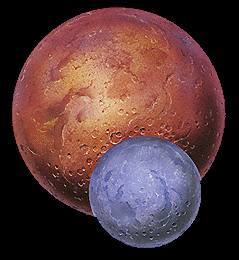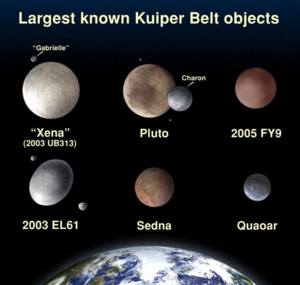Planet, Gone!
Blog topic:

An artist rendition of the Pluto Charon system. Formerly a planetary system, now just dwarf planets. Note that because Charon is massive, the center of mass is outside Pluto.
Pluto's status before Xena
For a long while, the only known objects beyond the orbit of Neptune were Pluto and long period comets. Obviously, a clear distinction existed and Pluto could be without a problem defined as a planet, albeit one which is different from the outer four giant gas planets.As some point, however, objects which are now known to be part of the so called Kuiper belt began being discovered. Slowly, this new set of objects started to become comparable to the asteroid belt. The asteroid belt is a "belt" of stony objects between mars and Jupiter. The Kuiper belt is similar, it is a belt of icy objects which lays beyond the orbit of Neptune.
As more Kuiper belt objects were discovered it became progressively clearer that the 2000 km in diameter Pluto is simply the largest Kuiper belt object, just as much as the 1000 km Ceres is the largest Asteroid belt object. Namely, it is clear that Pluto and Ceres are the largest in a spectrum of objects that extend to smaller masses and not the lightest of similar but more massive objects. Thus, it was apparent at this stage that these objects, which are smaller than our moon, should not be classified as planets but as planetoids (or "dwarf planets", if you like Snow White). Historically however, Ceres was discovered together with other asteroids, so it was never classified as a planet while Pluto was discovered by itself and thus classified as a planet.
As long as Pluto was the largest Kuiper belt object, the distinction between planet and planetoid (or dwarf planet) could be kept such that Pluto remained a planet. Anything larger than pluto and orbiting around the sun is a planet. Anything else, isn't.
This continued to be the situation even once relatively large Kuiper belt objects were discovered, including Sedna and Quaoar which are somewhat smaller than Pluto. Placing a distinction between Pluto and these objects was already pushing it, but still legitimate. This has changed with the discovery of Xena.
Pluto after Xena
The recent discovery of 2003 UB313 (nicknamed Xena) changed all that. Why? Because it is larger than Pluto! If Pluto is a planet, so is Xena. With Xena in the game, it was clear that either there are only eight planets, or there are more. How much more is not clear since some arbitrary lower mass cutoff would determine which object is and which isn't a planet.Personally, having grown up on the idea that there are 9 planets of which Pluto is the last, I must admit that downgrading our solar system to only 8 planets would seem rather strange. As apparent from above, however, it is the reasonable thing to do. Pluto, Xena, Ceres etc, are simply the largest of a set containing many smaller objects. If they are planets, then all the smaller objects should be too, at least down to a reasonable cutoff. One possibility is the mass above which the self gravity of the object is large enough to force it to be round (this takes place for objects larger than a few hundred kilometers). Under this definition, the solar system has dozens of planets, including long known asteroids such as Ceres. Since we don't think of Ceres as a planet, we shouldn't of Pluto either.
The IAU astronomers followed the same logic and thus tried to formulate a proper definition of a planet. Instead, they came up with a concocted definition under which Pluto is indeed not a planet, but neither is Earth for that matter.
According to the IAU, the definition of a planet is an object which
- is in orbit around a star or stellar remnants;
- has sufficient mass for its self-gravity to overcome rigid body forces so that it assumes a hydrostatic equilibrium (nearly round) shape;
- is not massive enough to initiate thermonuclear fusion of deuterium in its core; and,
- has cleared the neighbourhood around its orbit.
Xena on the other hand, is in a very distant neighborhood which is relatively clean of known objects (it was probably scattered to this orbit, and there is probably significantly more debris over there, but we don't know that for sure), so perhaps Xena according to this definition is a planet, it even has its own moon (Pluto incidentally has 3). Clearly the new definition of a planet is, well, a bad one.
A much better definition for a planet would be any object which
- is in orbit around a star or stellar remnants;
- has sufficient mass for its self-gravity to overcome rigid body forces so that it assumes a hydrostatic equilibrium (nearly round) shape;
- is not massive enough to initiate thermonuclear fusion of deuterium in its core; and,
- is more massive than the total mass of the objects crossing its orbit.
Incidentally, another interesting definition would be any object which is not a star or moon, and which has a large enough mass to keep an atmosphere. This would keep Pluto as a planet (which has an atmosphere for parts of its orbit, when it is warm enough to keep the atmosphere gaseous), but it would demote Mercury which doesn't have any significant atmosphere, and would not "planetize" Xena which is too cold to keep an atmosphere.
Evidently, there are a few reasonable definitions for a planet (but none which is significantly better than the rest), however, the definition chosen by the IAU is not even reasonable.


Comments (5)
Hi! I have a blog article about the CLOUD collaboration and your theories etc. about cosmic rays forcings.
Best wishes, Lubos
Comment: Yes I know. I often read your blog. (interesting and often provocative ;-) ) - Nir
I know that as a scientist want-to-be, I should be more calculated about what we call a plant. But I will certainly miss Pluto. I came to look at it like Pluto from Popeye, all cuddly and not chauvinist.
It will be missed :-(
Comment: Yes, many of us we will miss it... but I realized that my older son received the news in a rather nonchalant way... "o.k., so we have just 8 planets..." - Nir
I will miss Pluto too.....but hey this new planet Xena sounds exciting!
Second definition is very logical and sounds correct.Did you come up to it yourself? And also I'd like to know if the first was so wrong why was it approved by the scientists.I mean there are atleast three examples of planets without cleared orbits, which prove the definition to be non appropriate how come it was still approved , didn't they consider that their definition had such flaws already?
In science the only legitimate reason for creating a classification is to better understand a subject. A scientist would reject the label "race" as a meaningless subcategory of homo sapiens that differentiates by pigmentation; from a scientific standpoint this label us useless.-
Similarly, the term "planet" is a purely arbitrary label for the largest orbital bodies in the vicinity of our star that have some characteristics similar to the orbital body that our species occupies.
This species-centric worldview isn't scientific, and impedes our investigation of the universe by limiting our consideration of "life supporting" star systems to those which might support LIFE AS WE UNDERSTAND IT. Human understanding and human life are consider to be the ultimate standards against which all is possible.
This is an absurd way for scientists to investigate anything. Science is barely starting to understand the nature of our form of life, and lacks the tools to consider life or intelligence on a scale dissimilar to our own.
A debate about arbitrary, useless, categorizations of solar orbital bodies is as silly as a debate about which motion picture is the "best", or which actor is the most handsome.
What we need to do is stop these useless debates and start SERIOUSLY investigating the universe for ways to help our species SURVIVE the global disaster we have been enhancing. Anything less than this is silly posturing.